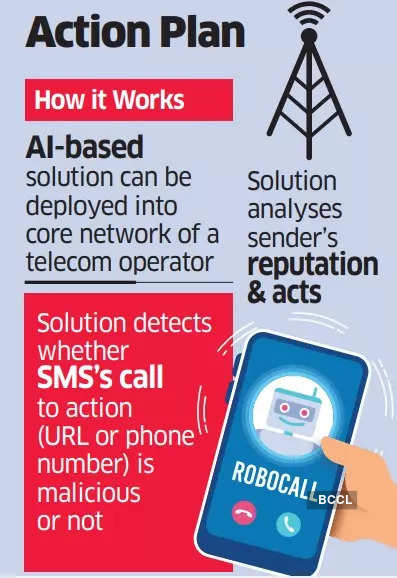You may soon get an AI shield to thwart phishing via SMSes
Indian mobile consumers may finally get some respite from phishing and cyber frauds, which lead to estimated financial losses of Rs 1,000-1,500 crore every month.
The initial results from a trial of an artificial intelligence (AI)-based solution being undertaken by Vodafone Idea (Vi) and Tanla Platforms to curb phishing and cyber frauds emanating from misuse of SMSes have returned an accuracy rate of over 99%. This means that the AI-based solution is stopping phishing attempts through SMSes most of the time.
The final results from the trial will be shared with Telecom Regulatory Authority of India (Trai), which is already working with financial regulators including the Reserve Bank of India (RBI) and Securities and Exchange Board of India (Sebi) to curb the menace of such online frauds.

“I had an opportunity to see the solution and I am genuinely amazed by the initial insights… I am sure the product will be a major success in India and worldwide,” Trai chairman PG Vaghela said on the sidelines of the Mobile World Congress.
Tanla’s AI-based solution can be deployed into the core network of a telecom operator. With the use of AI, the solution detects whether the SMS’s call to action (URL or phone number) is malicious or not. The solution, using AI and deep learning, analyses the sender’s reputation and acts. For instance, if the sender is a recorded spammer or a fraudster, it will block the message.
Trai has been trying various means of curbing phishing and has been advocating the use of AI and machine learning (ML) to tackle the menace. The regulator had approved Tanla Platforms and Vi to undertake the trial of the solution for three months.
As per estimates, India ranks among the largest markets for SMS phishing, with over six million citizens scammed annually, resulting in an estimated loss of around Rs 15,000 crore. The country’s growing mobile user base and low SMS rates have led to SMS phishing becoming one of the most prevalent forms of scam, say experts. As per Tanla’s analysis, over 5 billion SMS phishing attempts are made in India annually.
Further, only 1% of scammers are believed to have contributed to 70% of the phishing scams, amounting to Rs 700-850 crore worth of financial losses every month.
Industry executives and officials at Trai say scammers are becoming smarter and faster to revise their modus operandi within 24 hours, making it difficult for enforcement agencies to catch them. The fraudsters are now recycling SIMs and misusing older or unused registered headers of registered telemarketers.
“The problem is real and huge. Now is not the time to experiment. Our solution acts as a single platform to solve the phishing problem end-to-end. It protects the user, disables the scam and eliminates the scammer. It enables brands to always be three steps ahead of the fraudster,” said Uday Reddy, chief executive officer at Tanla.
As phishing events rise across the country, enterprises, telcos and regulators have been asking for technology-based solutions that make the digital ecosystem safer.
Vaghela said Trai was the first regulator to introduce blockchain-based distributed ledger technology (DLT) solution to curb the menace of spam.
On February 16, the regulator asked telcos to block all unverified headers and message templates within 30 and 60 days respectively, in a bid to contain the menace.
Trai has also recently announced the formation of a joint committee of regulators comprising Trai, RBI, Sebi and the consumer affairs ministry to address the issue of pesky calls and messages.
(The reporter is in Barcelona to cover the Mobile World Congress at the invitation of OnePlus.)
 Firewall Security Company India Complete Firewall Security Solutions Provider Company in India
Firewall Security Company India Complete Firewall Security Solutions Provider Company in India











